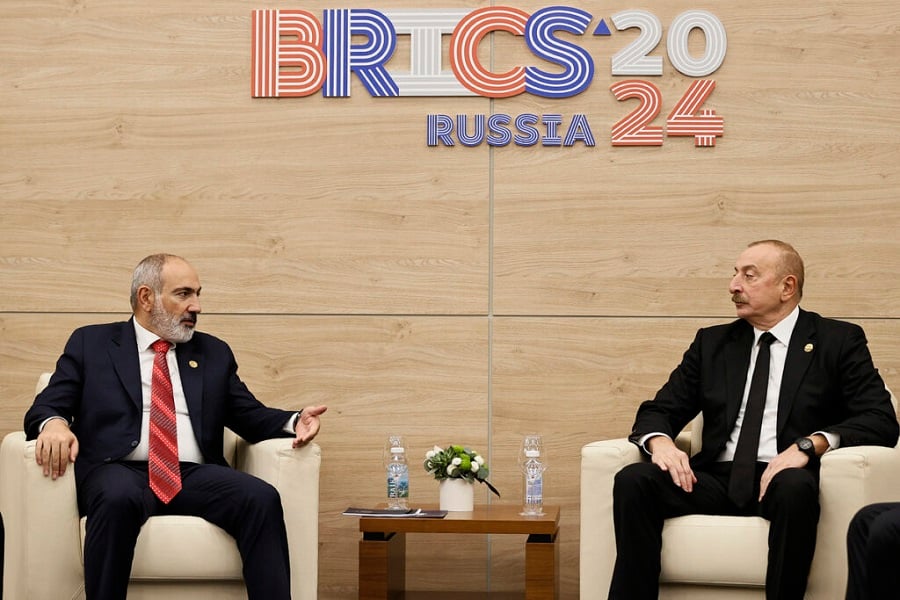The Armenian Weekly. Azerbaijani President Ilham Aliyev has confirmed the regulations governing the joint activities of the commissions responsible for border demarcation and security with Armenia. This follows the signing of a border demarcation law by Armenian President Vahagn Khachatryan on October 24.
The Armenian National Assembly ratified the regulations on October 23, with only the ruling “Civil Contract” party present, as opposition factions chose to boycott the vote. The bill received 67 votes in favor.
In a press briefing on October 28, Chief of General Staff of the Armenian Armed Forces Edward Asryan expressed strong agreement with the prime minister on the ongoing border demarcation process, asserting that it aims to restore the Republic of Armenia’s sovereign territory within defined borders. When asked whether Azerbaijan would return the occupied territories of the Republic of Armenia, Asryan stated, “Yes, I am confident. It is possible through peaceful demarcation efforts.”
Armenian National Security Service Director Armen Abazyan echoed these sentiments, confirming the continuation of the border demarcation process and the signing of relevant regulations by Armenia and Azerbaijan. When asked whether Azerbaijani forces will withdraw from sovereign Armenian territory, Abazyan replied, “I believe yes.”
Read also
Abazyan also addressed security operations along the Armenian-Iranian border, noting a preliminary agreement for Armenian border guard forces to assume full control of the Agarak border checkpoint starting January 1, 2025. Ongoing discussions are focused on potential joint border services with Russian guards along the broader Armenian-Iranian border.
However, he clarified that no decisions have been made to grant complete responsibility of border security to Armenia. When asked about Armenia’s capacity to implement such measures, he stated, “In a phased approach, yes, but there is no such decision at this time.”
Meanwhile, Turkish President Recep Tayyip Erdoğan has stated Ankara’s commitment to facilitating the peace process between Armenia and Azerbaijan. Addressing the Turkish Cabinet on October 29, 2024, Erdoğan expressed strong support for initiatives undertaken by the “fraternal” nations and assured that Turkey will closely monitor ongoing developments.
“We believe there is a unique opportunity for lasting peace,” Erdoğan stated, emphasizing hope that “external forces” would not undermine the process. He did not specify which external forces. “We expect to hear positive news soon, and we will continue to work in coordination with our Azerbaijani brothers.”
Erdoğan also highlighted the effectiveness of the “3+3” regional platform involving Armenia, Azerbaijan, Georgia, Iran and Russia, which recently convened on October 18 in Istanbul. He indicated Turkey’s desire to transform it into a more formal institutional framework.
While Armenian government leaders offer assurances, MP Tigran Abrahamyan of the opposition “I Have Honor” faction expressed skepticism about the likelihood that Azerbaijani troops will eventually withdraw from Armenian territory as part of the demarcation process.
Abrahamyan noted that signed agreements, international resolutions and international law have not prevented nations around the world from committing acts of aggression or occupying foreign territories. He underscored that the agreements reached by Armenian authorities are vulnerable, and Azerbaijan has the flexibility to act based on evolving circumstances. He warned that signing incomplete border demarcation provisions poses a potential risk, which could lead to unpredictable escalations.
In an interview with the Weekly, “Armenia” faction MP Garnik Danielyan expressed strong criticism of the Armenian government’s handling of the border demarcation process. He argued that the signing of the regulatory documents was rushed, suggesting that Azerbaijan’s president directed Armenian officials to do so during the BRICS summit in Kazan.
“These individuals have ceded a portion of our homeland to Azerbaijan without establishing clear regulations. The most protected part of Tavush has been given to Azerbaijan, and Armenia has gained nothing in return,” he said. “Bayramov’s office has declared, ‘Forget about the 31 settlements. We have nothing to offer you,’” referring to the Armenian villages occupied by Azerbaijan.
This diplomatic activity unfolded in the wake of the 16th BRICS summit, held in Kazan from October 22-24, 2024. Regional stability and cooperation were key topics of discussion. Armenian Prime Minister Nikol Pashinyan and Pres. Aliyev met on the sidelines of the summit on October 24.
The leaders discussed advancing the bilateral peace agenda, including the peace treaty, border demarcation and other areas of mutual interest. They tasked their foreign ministers with continuing bilateral negotiations on the “Agreement on the Establishment of Peace and Inter-State Relations,” aiming to finalize and sign the agreement “in the shortest possible period,” according to a brief statement from PM Pashinyan’s office.
During the conference, PM Pashinyan addressed Armenian-Azerbaijani relations, noting that at least 80-90% of the draft peace treaty with Baku is complete. He stated that mutual commitments to refrain from territorial claims, non-use of force and the establishment of diplomatic relations have been agreed upon.
The prime minister added that Armenia has proposed to facilitate border and customs control procedures to ensure Azerbaijan’s connectivity with its exclave Nakhichevan. He remarked that the text of the peace treaty, as currently agreed upon, establishes a strong and durable foundation for lasting peace and invited Azerbaijan to sign the agreement. While Armenia has recently proposed signing an interim agreement and resolving remaining issues at a later date, Azerbaijan has rejected this proposal.
In an article published by the “Genesis Armenia” think tank, Armen Hovasapyan criticized Pashinyan for appearing amicable with a leader who has publicly insulted him, questioning the motivations behind this dynamic. Hovasapyan speculated that discussions at the summit may have included control over a corridor through Syunik, possibly involving a customs structure under the BRICS framework, which could satisfy all involved parties.
Ultimately, Hovasapyan argued that upon Pashinyan’s return from Kazan, Armenia is in a weakened position, particularly in light of the loss of Artsakh
Hoory Minoyan
Armenian PM Nikol Pashinyan and the President of Azerbaijan Ilham Aliyev meet in Kazan on the sidelines of the 16th BRICS summit (Photo: RA Prime Minister’s office, October 24, 2024)





















































